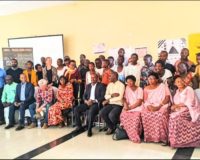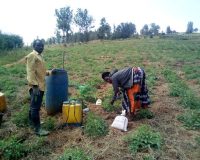JOB SATISFACTION
Two Scholars have inspired the two sessions: Dr John L. Holland and the Psychologist Davis
According to Holland’s theory, there are four stages in choosing a career:
Knowing yourself: you depend on cognitive factors (mental ability) and non-cognitive factors such as interests, personality, values, abilities, skills, self-efficacy and confidence.
Knowing working environment: you consider your stressors, policies, nature and environment requirements that will facilitate or harm you in your daily work for better achievement.
Matching yourself and the working environment: see if the working environment is responding to individual’s needs.
Making a decision: after this analysis, take decision of working within that environment or not.
Career choice is influenced by cognitive factors and mental abilities and there are five types of employees:
* • Realistic people like working with their hands, tools and machines, and view themselves as practical, reliable mechanically-inclined workers
* • Investigative people like to explore and solve problems by researching new ideas, completing experiments and reviewing data.
* • Artistic individuals are drawn to express themselves by creating and designing things or through performance.
* • Social people are focused on helping others, whether through teaching, training, service or applied care, all with the focus being on working with other people.
* • Enterprising people are leaders who are drawn to influence and encourage others, providing direction and planning.
* • Conventional individuals like working with data and numbers in a set procedural way; they’re methodical, thorough and pay attention to detail.
Exercise: which kind of individual am I? Who do I need to fulfill my duties at work?
PROFESSIONALISM
Five stages of career development
Dewis’s theory on five stages of career development defined in the Self Concept Theory is recognized as the cycle of individual’s career:
- Growth: This early stage is the place to develop self-concept, attitudes and needs, as well as defining abilities and areas of interest.
- Exploration: In this stage, individuals try on a few different roles, and eventually focus on a specific career direction and look for additional education and training.
- Establishment: This stage is where a career is developed to the point of being stable; individuals settle into their roles and advance as needed.
- Maintenance: The stage where an employee is securely established in their role and needs to decide whether to “hold on” (i.e., stagnate in the role) or “keep up” (i.e., continuing to improve by updating skills).
- Decline or disengagement: This final stage is the point where an employee’s focus moves to things outside the job: retirement, leisure activities or a new career.
Work is conceptualized as an interaction between an individual and the environment.
Career success for an individual is based on job satisfaction, job stability and achievement.
We are all working following six interests that are linked with four types of personality
- Realistic Have mechanical ability….
- Investigative interest :Like to observe, analyze, research
- Artistic: Artistic, imaginative, creative,…
- Social activities: Compassionate, like to help others
- Enterprising: Like to persuade, influence, lead
- Conventional: Like to work with data, careful
Four personalities: Extroversion/Openness, Introversion, Agreeableness, Consciousness
Factors and values that make people to succeed or fail in making decision in their career
Skills: Qualification and ethic consideration
Character: Values (respectful, flexibility)
Environment: Relationships and no stressors
Self esteem: Ability to manage relationships
This theory linking job satisfaction with life satisfaction (individual, family, social) was a call to everyone to think the level of job satisfaction, link it with personalities and interests, needs and requirements, environment and motivation.
Thank you @UWIHOREYE Chaste, @UNM Country Director for this important session












